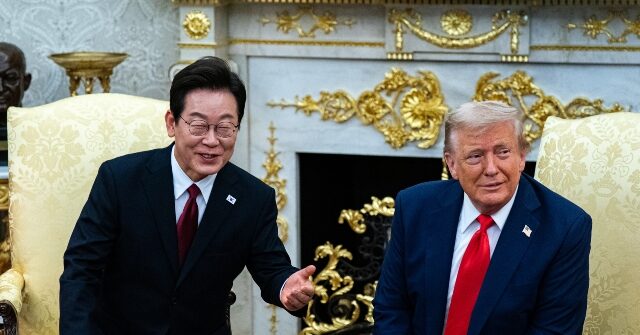South Korea has temporarily backed off on an anti-American regulation designed to discriminate against American companies after the Trump administration called out these policies while promoting America First trade priorities.
In August, President Trump posted his thoughts on companies targeting American tech companies to Truth Social:
I will stand up to Countries that attack our incredible American Tech Companies. Digital Taxes, Digital Services Legislation, and Digital Markets Regulations are all designed to harm, or discriminate against, American Technology. They also, outrageously, give a complete pass to China’s largest Tech Companies. This must end, and end NOW!
While he did not single out South Korea, his description perfectly applied to the country’s Platform Fair Competition Promotion Act, which would expand its Fair Trade Commission (often referred to as the KFTC in comparison to America’s FTC), which would force American firms to turn over their algorithms to South Korea’s left-wing government.
While the law is ostensibly about “monopolies,” it is designed to go after American companies, while leaving dominant Chinese and South Korean firms untouched. As Jamieson Grier, now Trump’s U.S. Trade Representative, wrote in 2024, it allows the “apparent exclusion of massive Chinese companies from the KFTC’s proposed regulatory scheme. They are likely to fall below the criteria for monthly average users, unlike US tech companies.”
House Judiciary Chairman Jim Jordan (R-OH) and Antitrust Subcommittee Chairman Scott Fitzgerald (R-WI) wrote to the South Korean government on July 24, noting that laws like the Platform Fair Competition Promotion Act “often benefit companies that have close ties to the People’s Republic of China and require American companies to hand over vast amounts of highly valuable proprietary data to foreign-owned competitors and adversarial nations.”
FTC Chairman Andrew Ferguson has taken leadership on protecting American companies from discriminatory antitrust laws abroad. On September 3, he spoke at the Korean Fair Trade Commission’s International Competition Forum in Seoul, and stated plainly: “The United States expects fair treatment for its firms. . .When our firms do business overseas, we expect regulators to follow due process norms and to offer equal treatment. That means, we expect that foreign governments not only treat our firms the same as other firms, but also that they treat our firms the way we treat theirs.”
Ferguson’s speech was designed to ensure that Trump’s trade strategy in South Korea remains effective. The next day, the Korea Times reported that Korea’s nominee to the Fair Trade Commission Ju Biung-ghi referenced “comments made by U.S. Federal Trade Commission Chairman Andrew Ferguson, who recently voiced strong concerns about what he described as discriminatory treatment of American companies,” as why Korea could not impose this anti-American law. He added, “Given the importance of trade negotiations, it is currently difficult to aggressively pursue the platform monopoly regulation act.”
However, the fight is far from over. As the US and South Korea continue to negotiate their trade agreement, protecting against these discriminatory laws will remain a top priority.
Ferguson’s leadership also demonstrates the correct America First position on foreign Big Tech regulation. He is willing to use his influence to counter Chinese influence and anti-American protectionism targeting US-based tech companies. However, he is not allowing them to use foreign regulations as an excuse to spy on or censor Americans. Just days before his speech in Seoul, he warned over a dozen tech companies, including Meta, Amazon, Microsoft, and Google.
In a letter sent to more than a dozen prominent tech platforms, Ferguson wrote:
Weakening encryption or other security measures to comply with the laws, demands, or expected demands of a foreign government may also violate Section 5. If a company promises consumers that it encrypts or otherwise keeps secure online communications but adopts weaker security due to the actions of a foreign government, such conduct may deceive consumers who rightfully expect effective security, not the increased susceptibility to breach or intercept desired by a foreign power.
Consumers may be further deceived if companies fail to prominently disclose that weaker security measures were adopted due to the actions of a foreign government, information that might be material to a consumer’s decision to use a service. It might also be an unfair practice to weaken the security of Americans’ communications to placate foreign powers that do not have Americans’ best interests at heart and that might seek to surveil or otherwise hurt Americans. Censoring Americans to comply with a foreign power’s laws, demands, or expected demands can also violate Section 5.
American consumers do not reasonably expect to be censored to appease a foreign power and may be deceived by such actions. And as with weakened security measures, consumers might be further deceived if companies do not prominently disclose that censorious policies were adopted due to the actions of a foreign government, as consumers might not want to use a service that exposes them to censorship by foreign powers. Further, it might be an unfair practice to subject American consumers to censorship by a foreign power by applying foreign legal requirements, demands, or expected demands to consumers outside of that foreign jurisdiction.
Protecting the privacy and security of Americans’ personal data and safeguarding their liberty by combatting illegal censorship are priorities for the Trump-Vance FTC.
Breitbart News will continue to report on foreign countries attempted to control American tech companies.
Lucas Nolan is a reporter for Breitbart News covering issues of free speech and online censorship.
Read the full article here


